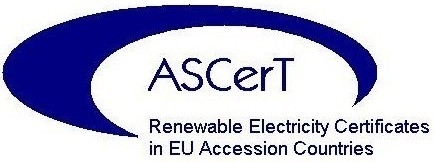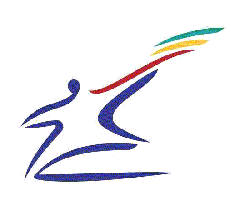Renewable Electricity Certificates in EU Accession Countries

|
 |
The
Newly Associated States (NAS) of the European Union have challenging targets
for the growth of renewable electricity generation over the next few years.
This is in response to domestic concerns over the environment and security
of supply, as well as the forthcoming requirement to comply with the European
Directive on renewable electricity .
Tradable Green Certificate (TGC) systems have emerged in a number of countries
around the world over the last few years as a method of supporting renewable
electricity in the context of liberalised electricity markets. Such systems
are of particular relevance to the NAS, because they have potential renewable
electricity targets in a more economically efficiency manner than other support
policies and measures. However, in most NAS, there is low awareness of TGC
systems and the subject has yet to be studied or discussed in detail.
ASCerT
project objectives
The overall objective of the ASCerT project is to investigate the application
of green certificate trading systems for the support of renewable electricity
production in five NAS (Bulgaria, Czech Republic, Hungary, Poland & Romania).
The project will work with key stakeholders in each country to examine the
potential for utilising TGC systems to promote renewables and to estimate
the costs and benefits of a TGC system in comparison to alternative support
measures.
The ASCerT project started in January 2003 and will run for one year. It is
supported by the European Commission Directorate General for Research.
Work
plan and expected results
The
ASCerT project is organised into four main phases, which will happen in parallel
in the five study countries. The first phase will see the establishment of
a Country Teams comprising representatives from government, regulators and
industry. These teams will be main means to ensure stakeholder participation
in the project. It is intended that the Country Teams meet regularly during
the duration of the project provide input to the project activities and to
review progress. Some flexibility in the project time-table and work plan
is envisaged to allow the project to be 'customised' to the situation
in each country. Potential members of these teams will invited to an information
meeting in each country in March 2003, where the project will be presented
and the role of the Country Team discussed.
The second phase will review the current status of renewables and the electricity sector. The project team will then develop an outline the options for a TGC system design in each country, in consultation with the Country Teams. This third phase will culminate in an International Workshop in Budapest in September 2003, where the options for TGC system designs will be presented and discussed with participants from the five countries.
The final phase will analyse the potential costs and benefits of TGC systems in comparison with existing or competing renewable support measures. The results of this analysis, along with the preliminary conclusion of the project as a whole will be presented and discussed at a Second International Workshop in Sofia in December 2003. There is some budget coverage for selected members of the Country Teams to attend both these international workshops.
Figure 1: The outline work plan and time table of the ASCerT project.